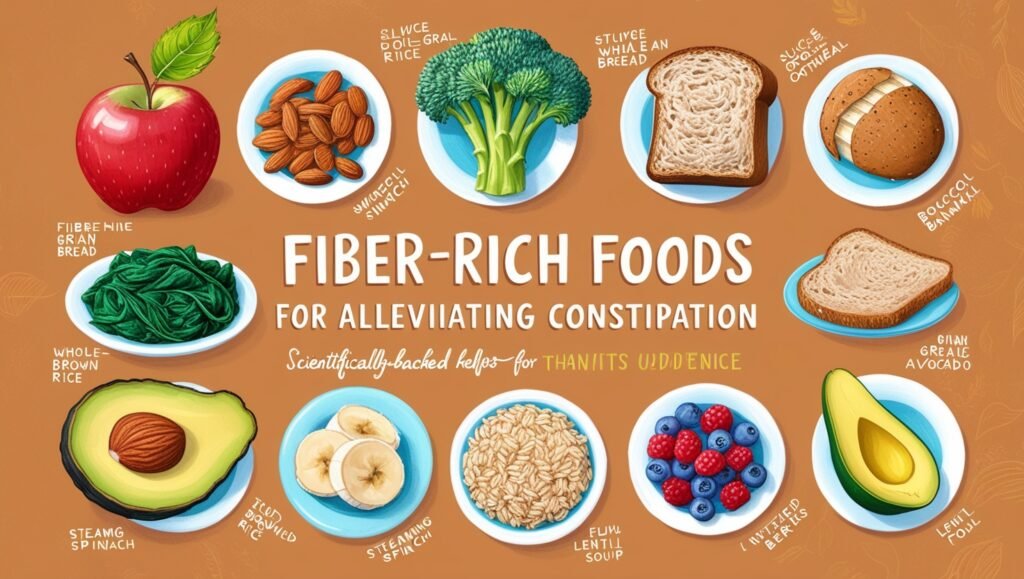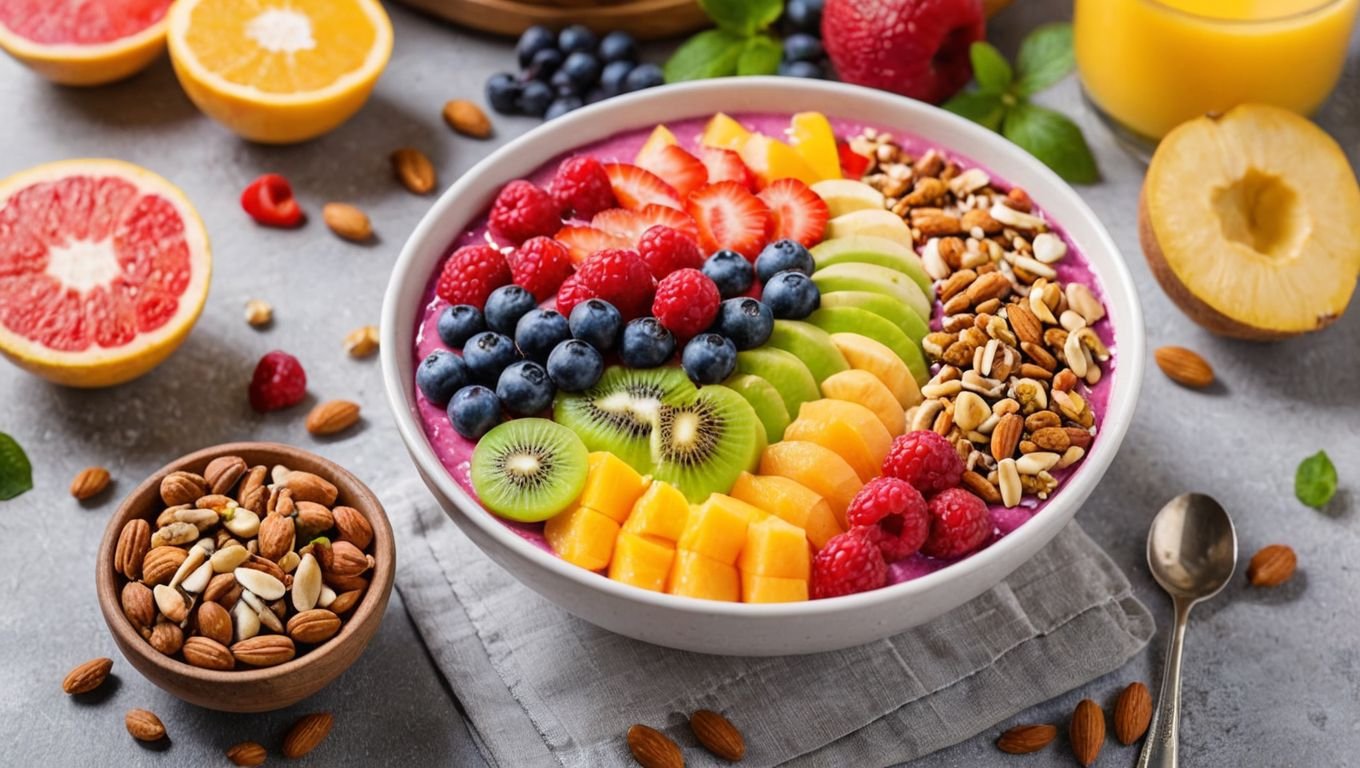
10 Powerful Fiber Foods to Beat Constipation!
Discover 10 powerful fiber foods that help alleviate constipation and promote digestive health for a better lifestyle.


Introduction
Brief Overview of the Importance of Digestive Health
Digestive health is a cornerstone of overall well-being. A healthy digestive system ensures that our bodies efficiently absorb nutrients from the food we eat, which is essential for maintaining energy levels, supporting immune function, and promoting overall health. Poor digestive health can lead to a range of issues, including constipation, bloating, and discomfort, which can significantly impact our quality of life. Therefore, maintaining a healthy digestive system is crucial for our physical and mental well-being.
Introduction to Fiber-Rich Foods as Natural Remedies for Constipation
One of the most effective ways to support digestive health and prevent constipation is by incorporating fiber-rich foods into our diet. Dietary fiber, found in plant-based foods, plays a vital role in promoting regular bowel movements and preventing constipation. There are two types of dietary fiber: soluble and insoluble. Soluble fiber dissolves in water to form a gel-like substance, which helps soften stools and make them easier to pass. Insoluble fiber adds bulk to the stool, promoting regular bowel movements and preventing constipation. We can naturally support our digestive health and prevent constipation by including a variety of fiber-rich foods in our diet.
Purpose of the Article
The purpose of this article is to highlight the top 10 powerful fiber foods that can help alleviate constipation and promote digestive health. By understanding the nutritional benefits of these foods and how they contribute to digestive health, readers can make informed choices to improve their diet and overall well-being.

1. Apples
Nutritional Profile of Apples
Apples are a popular and versatile fruit that is rich in essential nutrients. They are an excellent source of dietary fiber, vitamins, and antioxidants. Here is a breakdown of the nutritional profile of a medium-sized apple:
Table: Nutritional Profile of Apples
| Nutrient | Amount per Serving (1 medium apple) |
|---|---|
| Calories | 95 |
| Fiber | 4g |
| Vitamin C | 14% DV |
| Antioxidants | High |
Benefits of Apples for Digestive Health and Constipation Relief
Apples are particularly beneficial for digestive health due to their high fiber content. The fiber in apples is primarily soluble fiber in the form of pectin, which helps soften stools and promote regular bowel movements. Additionally, the insoluble fiber in apple skins adds bulk to the stool, making it easier to pass. The combination of soluble and insoluble fiber in apples makes them an effective natural remedy for constipation.
Scientific Studies Supporting the Benefits of Apples
Several scientific studies have highlighted the benefits of apples for digestive health. Research has shown that the pectin in apples can increase stool frequency and improve stool consistency, making it an effective treatment for constipation. Additionally, studies have found that regular consumption of apples can promote the growth of beneficial gut bacteria, which further supports digestive health.
Tips on Incorporating Apples into Your Diet for Better Digestion
Incorporating apples into your diet is easy and can be done in various ways:
- Snack on Fresh Apples: Enjoy a fresh apple as a convenient and healthy snack.
- Add to Salads: Slice apples and add them to salads for a sweet and crunchy addition.
- Make Applesauce: Prepare homemade applesauce by cooking apples with a bit of water and cinnamon.
- Bake with Apples: Use apples in baking recipes, such as apple muffins or apple crisps.
- Blend into Smoothies: Add apple slices to your favorite smoothie recipes for added fiber and flavor.
2. Oats
Nutritional Profile of Oats
Oats are a highly nutritious whole grain that is rich in fiber, protein, and essential vitamins. They are an excellent source of both soluble and insoluble fiber, making them a powerful food for digestive health. Here is a breakdown of the nutritional profile of one cup of cooked oats:
Table: Nutritional Profile of Oats
| Nutrient | Amount per Serving (1 cup cooked) |
|---|---|
| Calories | 154 |
| Fiber | 4g |
| Protein | 6g |
| Iron | 10% DV |
Benefits of Oats for Digestive Health and Constipation Relief
Oats are particularly beneficial for digestive health due to their high fiber content. The soluble fiber in oats, known as beta-glucan, helps soften stools and promote regular bowel movements by forming a gel-like substance in the digestive tract. This gel-like substance also helps slow down digestion, allowing for better nutrient absorption. Additionally, the insoluble fiber in oats adds bulk to the stool, making it easier to pass and preventing constipation.
Scientific Studies Supporting the Benefits of Oats
Several scientific studies have highlighted the benefits of oats for digestive health. Research has shown that the beta-glucan in oats can increase stool frequency and improve stool consistency, making it an effective treatment for constipation. Additionally, studies have found that regular consumption of oats can promote the growth of beneficial gut bacteria, which further supports digestive health.
Tips on Incorporating Oats into Your Diet for Better Digestion
Incorporating oats into your diet is easy and can be done in various ways:
- Breakfast Oatmeal: Start your day with a bowl of oatmeal topped with fruits, nuts, and seeds.
- Overnight Oats: Prepare overnight oats by soaking oats in milk or yogurt and adding your favorite toppings.
- Smoothies: Add a handful of oats to your smoothies for added fiber and texture.
- Baking: Use oats in baking recipes, such as oatmeal cookies, muffins, and granola bars.
- Savory Dishes: Incorporate oats into savory dishes, such as meatloaf or veggie burgers, for added fiber.
By including oats in your daily diet, you can enjoy their delicious taste while reaping the benefits of improved digestive health and constipation relief.
3. Chia Seeds
Nutritional Profile of Chia Seeds
Chia seeds are tiny but mighty seeds that are packed with essential nutrients, including fiber, omega-3 fatty acids, and protein. They are an excellent source of both soluble and insoluble fiber, making them a powerful food for digestive health. Here is a breakdown of the nutritional profile of one ounce of chia seeds:
Table: Nutritional Profile of Chia Seeds
| Nutrient | Amount per Serving (1 oz) |
|---|---|
| Calories | 138 |
| Fiber | 10g |
| Omega-3 | 5g |
| Protein | 4g |
Benefits of Chia Seeds for Digestive Health and Constipation Relief
Chia seeds are particularly beneficial for digestive health due to their high fiber content. When chia seeds are soaked in liquid, they form a gel-like substance that helps soften stools and promote regular bowel movements. The soluble fiber in chia seeds helps slow down digestion, allowing for better nutrient absorption, while the insoluble fiber adds bulk to the stool, making it easier to pass and preventing constipation.
Scientific Studies Supporting the Benefits of Chia Seeds
Several scientific studies have highlighted the benefits of chia seeds for digestive health. Research has shown that the gel-forming properties of chia seeds can increase stool frequency and improve stool consistency, making them an effective treatment for constipation. Additionally, studies have found that regular consumption of chia seeds can promote the growth of beneficial gut bacteria, which further supports digestive health.
Tips on Incorporating Chia Seeds into Your Diet for Better Digestion
Incorporating chia seeds into your diet is easy and can be done in various ways:
- Chia Pudding: Prepare chia pudding by soaking chia seeds in milk or yogurt and adding your favorite toppings.
- Smoothies: Add a tablespoon of chia seeds to your smoothies for added fiber and texture.
- Baking: Use chia seeds in baking recipes, such as muffins, bread, and energy bars.
- Salads: Sprinkle chia seeds on salads for a crunchy and nutritious addition.
- Yogurt: Mix chia seeds into yogurt for a fiber-rich snack.
By including chia seeds in your daily diet, you can enjoy their nutritional benefits while improving your digestive health and relieving constipation.
4. Lentils
Nutritional Profile of Lentils
Lentils are a type of legume that is rich in fiber, protein, and essential vitamins. They are an excellent source of both soluble and insoluble fiber, making them a powerful food for digestive health. Here is a breakdown of the nutritional profile of one cup of cooked lentils:
Table: Nutritional Profile of Lentils
| Nutrient | Amount per Serving (1 cup cooked) |
|---|---|
| Calories | 230 |
| Fiber | 18 g |
| Protein | 18g |
| Folate | 90% DV |
Benefits of Lentils for Digestive Health and Constipation Relief
Lentils are particularly beneficial for digestive health due to their high fiber content. The soluble fiber in lentils helps soften stools and promote regular bowel movements by forming a gel-like substance in the digestive tract. This gel-like substance also helps slow down digestion, allowing for better nutrient absorption. Additionally, the insoluble fiber in lentils adds bulk to the stool, making it easier to pass and preventing constipation.
Scientific Studies Supporting the Benefits of Lentils
Several scientific studies have highlighted the benefits of lentils for digestive health. Research has shown that the fiber in lentils can increase stool frequency and improve stool consistency, making them an effective treatment for constipation. Additionally, studies have found that regular consumption of lentils can promote the growth of beneficial gut bacteria, which further supports digestive health.
Tips on Incorporating Lentils into Your Diet for Better Digestion
Incorporating lentils into your diet is easy and can be done in various ways:
- Soups and Stews: Add lentils to soups and stews for a hearty and fiber-rich meal.
- Salads: Use cooked lentils in salads for added protein and fiber.
- Curries: Prepare lentil curries with your favorite spices and vegetables.
- Burgers: Make lentil burgers by combining cooked lentils with breadcrumbs and seasonings.
- Side Dishes: Serve lentils as a side dish with your favorite main courses.
5. Berries
Nutritional Profile of Berries
Berries are a delicious and nutritious addition to any diet. They are packed with fiber, vitamins, and antioxidants, making them a powerful food for digestive health. Here is a breakdown of the nutritional profile of one cup of mixed berries:
Table: Nutritional Profile of Berries
| Nutrient | Amount per Serving (1 cup) |
|---|---|
| Calories | 85 |
| Fiber | 8g |
| Vitamin C | 24% DV |
| Antioxidants | High |
Benefits of Berries for Digestive Health and Constipation Relief
Berries are particularly beneficial for digestive health due to their high fiber content. The fiber in berries helps add bulk to the stool, making it easier to pass and preventing constipation. Additionally, the antioxidants in berries help reduce inflammation in the digestive tract, promoting overall gut health.
Scientific Studies Supporting the Benefits of Berries
Several scientific studies have highlighted the benefits of berries for digestive health. Research has shown that the fiber in berries can increase stool frequency and improve stool consistency, making them an effective treatment for constipation. Additionally, studies have found that the antioxidants in berries can help reduce inflammation in the gut, further supporting digestive health.
Tips on Incorporating Berries into Your Diet for Better Digestion
Incorporating berries into your diet is easy and can be done in various ways:
- Smoothies: Add a handful of mixed berries to your smoothies for added fiber and antioxidants.
- Breakfast: Top your oatmeal, yogurt, or cereal with fresh or frozen berries.
- Snacks: Enjoy a bowl of mixed berries as a healthy and refreshing snack.
- Salads: Add berries to your salads for a sweet and nutritious addition.
- Desserts: Use berries in baking recipes, such as berry muffins, pies, and tarts.
By including berries in your daily diet, you can enjoy their delicious taste while reaping the benefits of improved digestive health and constipation relief.
6. Broccoli
Nutritional Profile of Broccoli
Broccoli is a nutrient-dense vegetable that is rich in fiber, vitamins, and minerals. It is an excellent source of both soluble and insoluble fiber, making it a powerful food for digestive health. Here is a breakdown of the nutritional profile of one cup of cooked broccoli:
Table: Nutritional Profile of Broccoli
| Nutrient | Amount per Serving (1 cup cooked) |
|---|---|
| Calories | 55 |
| Fiber | 5g |
| Vitamin C | 135% DV |
| Vitamin K | 116% DV |
Benefits of Broccoli for Digestive Health and Constipation Relief
Broccoli is particularly beneficial for digestive health due to its high fiber content. The soluble fiber in broccoli helps soften stools and promote regular bowel movements by forming a gel-like substance in the digestive tract. This gel-like substance also helps slow down digestion, allowing for better nutrient absorption. Additionally, the insoluble fiber in broccoli adds bulk to the stool, making it easier to pass and preventing constipation.
Scientific Studies Supporting the Benefits of Broccoli
Several scientific studies have highlighted the benefits of broccoli for digestive health. Research has shown that the fiber in broccoli can increase stool frequency and improve stool consistency, making it an effective treatment for constipation. Additionally, studies have found that the vitamins and antioxidants in broccoli can help reduce inflammation in the gut, further supporting digestive health.
Tips on Incorporating Broccoli into Your Diet for Better Digestion
Incorporating broccoli into your diet is easy and can be done in various ways:
- Steamed Broccoli: Enjoy steamed broccoli as a side dish with your meals.
- Salads: Add raw or lightly steamed broccoli to your salads for added crunch and nutrition.
- Stir-Fries: Include broccoli in your stir-fry recipes with other vegetables and proteins.
- Soups: Add broccoli to soups and stews for a hearty and fiber-rich meal.
- Roasted Broccoli: Roast broccoli with olive oil, garlic, and your favorite seasonings for a delicious and healthy side dish.
By including broccoli in your daily diet, you can enjoy its delicious taste while reaping the benefits of improved digestive health and constipation relief.
7. Flaxseeds
Nutritional Profile of Flaxseeds
Flaxseeds are tiny seeds that are packed with essential nutrients, including fiber, omega-3 fatty acids, and protein. They are an excellent source of both soluble and insoluble fiber, making them a powerful food for digestive health. Here is a breakdown of the nutritional profile of one tablespoon of flaxseeds:
Table: Nutritional Profile of Flaxseeds
| Nutrient | Amount per Serving (1 tbsp) |
|---|---|
| Calories | 37 |
| Fiber | 2g |
| Omega-3 | 1.3 g |
| Protein | 1.3g |
Benefits of Flaxseeds for Digestive Health and Constipation Relief
Flaxseeds are particularly beneficial for digestive health due to their high fiber content. When flaxseeds are soaked in liquid, they form a gel-like substance that helps soften stools and promote regular bowel movements. The soluble fiber in flaxseeds helps slow down digestion, allowing for better nutrient absorption, while the insoluble fiber adds bulk to the stool, making it easier to pass and preventing constipation.
Scientific Studies Supporting the Benefits of Flaxseeds
Several scientific studies have highlighted the benefits of flaxseeds for digestive health. Research has shown that the gel-forming properties of flaxseeds can increase stool frequency and improve stool consistency, making them an effective treatment for constipation. Additionally, studies have found that regular consumption of flaxseeds can promote the growth of beneficial gut bacteria, which further supports digestive health.
Tips on Incorporating Flaxseeds into Your Diet for Better Digestion
Incorporating flaxseeds into your diet is easy and can be done in various ways:
- Smoothies: Add a tablespoon of ground flaxseeds to your smoothies for added fiber and omega-3s.
- Baking: Use ground flaxseeds in baking recipes, such as muffins, bread, and energy bars.
- Salads: Sprinkle ground flaxseeds on salads for a crunchy and nutritious addition.
- Yogurt: Mix ground flaxseeds into yogurt for a fiber-rich snack.
- Oatmeal: Add ground flaxseeds to your oatmeal for added nutrition and texture.
By including flaxseeds in your daily diet, you can enjoy their nutritional benefits while improving your digestive health and relieving constipation.
8. Pears
Nutritional Profile of Pears
Pears are a delicious and nutritious fruit that is rich in fiber, vitamins, and antioxidants. They are an excellent source of both soluble and insoluble fiber, making them a powerful food for digestive health. Here is a breakdown of the nutritional profile of a medium-sized pear:
Table: Nutritional Profile of Pears
| Nutrient | Amount per Serving (1 medium pear) |
|---|---|
| Calories | 101 |
| Fiber | 6g |
| Vitamin C | 12% DV |
| Antioxidants | High |
Benefits of Pears for Digestive Health and Constipation Relief
Pears are particularly beneficial for digestive health due to their high fiber content. The fiber in pears helps add bulk to the stool, making it easier to pass and preventing constipation. Additionally, the antioxidants in pears help reduce inflammation in the digestive tract, promoting overall gut health.
Scientific Studies Supporting the Benefits of Pears
Several scientific studies have highlighted the benefits of pears for digestive health. Research has shown that the fiber in pears can increase stool frequency and improve stool consistency, making them an effective treatment for constipation. Additionally, studies have found that the antioxidants in pears can help reduce inflammation in the gut, further supporting digestive health.
Tips on Incorporating Pears into Your Diet for Better Digestion
Incorporating pears into your diet is easy and can be done in various ways:
- Snack on Fresh Pears: Enjoy a fresh pear as a convenient and healthy snack.
- Add to Salads: Slice pears and add them to salads for a sweet and crunchy addition.
- Bake with Pears: Use pears in baking recipes, such as pear muffins or pear crisps.
- Blend into Smoothies: Add pear slices to your favorite smoothie recipes for added fiber and flavor.
- Poached Pears: Prepare poached pears with spices for a delicious and healthy dessert.
9. Sweet Potatoes
Nutritional Profile of Sweet Potatoes
Sweet potatoes are a nutrient-dense root vegetable that is rich in fiber, vitamins, and minerals. They are an excellent source of both soluble and insoluble fiber, making them a powerful food for digestive health. Here is a breakdown of the nutritional profile of a medium-sized sweet potato:
Table: Nutritional Profile of Sweet Potatoes
| Nutrient | Amount per Serving (1 medium sweet potato) |
|---|---|
| Calories | 103 |
| Fiber | 4g |
| Vitamin A | 438% DV |
| Potassium | 15% DV |
Benefits of Sweet Potatoes for Digestive Health and Constipation Relief
Sweet potatoes are particularly beneficial for digestive health due to their high fiber content. The soluble fiber in sweet potatoes helps soften stools and promote regular bowel movements by forming a gel-like substance in the digestive tract. This gel-like substance also helps slow down digestion, allowing for better nutrient absorption. Additionally, the insoluble fiber in sweet potatoes adds bulk to the stool, making it easier to pass and preventing constipation.
Scientific Studies Supporting the Benefits of Sweet Potatoes
Several scientific studies have highlighted the benefits of sweet potatoes for digestive health. Research has shown that the fiber in sweet potatoes can increase stool frequency and improve stool consistency, making them an effective treatment for constipation. Additionally, studies have found that the vitamins and antioxidants in sweet potatoes can help reduce inflammation in the gut, further supporting digestive health.
Tips on Incorporating Sweet Potatoes into Your Diet for Better Digestion
Incorporating sweet potatoes into your diet is easy and can be done in various ways:
- Baked Sweet Potatoes: Enjoy baked sweet potatoes as a side dish with your meals.
- Mashed Sweet Potatoes: Prepare mashed sweet potatoes with a bit of butter and seasoning for a delicious and nutritious side dish.
- Sweet Potato Fries: Make sweet potato fries by cutting sweet potatoes into strips, tossing them with olive oil and seasoning, and baking them until crispy.
- Soups and Stews: Add sweet potatoes to soups and stews for a hearty and fiber-rich meal.
- Roasted Sweet Potatoes: Roast sweet potatoes with olive oil, garlic, and your favorite seasonings for a delicious and healthy side dish.
By including sweet potatoes in your daily diet, you can enjoy their delicious taste while reaping the benefits of improved digestive health and constipation relief.
10. Beans
Nutritional Profile of Beans
Beans are a type of legume that is rich in fiber, protein, and essential vitamins. They are an excellent source of both soluble and insoluble fiber, making them a powerful food for digestive health. Here is a breakdown of the nutritional profile of one cup of cooked beans:
Table: Nutritional Profile of Beans
| Nutrient | Amount per Serving (1 cup cooked) |
|---|---|
| Calories | 240 |
| Fiber | 15 g |
| Protein | 15g |
| Iron | 20% DV |
Benefits of Beans for Digestive Health and Constipation Relief
Beans are particularly beneficial for digestive health due to their high fiber content. The soluble fiber in beans helps soften stools and promote regular bowel movements by forming a gel-like substance in the digestive tract. This gel-like substance also helps slow down digestion, allowing for better nutrient absorption. Additionally, the insoluble fiber in beans adds bulk to the stool, making it easier to pass and preventing constipation.
Scientific Studies Supporting the Benefits of Beans
Several scientific studies have highlighted the benefits of beans for digestive health. Research has shown that the fiber in beans can increase stool frequency and improve stool consistency, making them an effective treatment for constipation. Additionally, studies have found that regular consumption of beans can promote the growth of beneficial gut bacteria, which further supports digestive health.
Tips on Incorporating Beans into Your Diet for Better Digestion
Incorporating beans into your diet is easy and can be done in various ways:
- Soups and Stews: Add beans to soups and stews for a hearty and fiber-rich meal.
- Salads: Use cooked beans in salads for added protein and fiber.
- Chili: Prepare chili with beans, tomatoes, and your favorite spices for a delicious and nutritious meal.
- Side Dishes: Serve beans as a side dish with your favorite main courses.
- Burgers: Make bean burgers by combining cooked beans with breadcrumbs and seasonings.
By including beans in your daily diet, you can enjoy their delicious taste while reaping the benefits of improved digestive health and constipation relief.
Conclusion
Incorporating fiber-rich foods into your daily diet is essential for maintaining optimal digestive health and preventing constipation. The ten powerful fiber foods highlighted in this article—apples, oats, chia seeds, lentils, berries, broccoli, flaxseeds, pears, sweet potatoes, and beans—are all excellent choices for promoting regular bowel movements and supporting overall gut health.
By making these fiber-rich foods a regular part of your diet, you can enjoy their numerous health benefits and improve your overall well-being. Remember, a balanced diet that includes a variety of nutrient-dense foods is key to maintaining a healthy digestive system and preventing digestive issues.
Additional Sections (Optional)
- DIY Fiber-Rich Recipes: Include a variety of DIY recipes using different fiber-rich foods.
- FAQs: Address common questions about fiber-rich foods, such as their benefits, usage, and potential side effects.
- Expert Interviews: Feature interviews with nutritionists or dietitians discussing the benefits of fiber-rich foods for digestive health.
This detailed article should help you understand the importance of fiber-rich foods for digestive health and provide you with practical tips on incorporating them into your diet.




4 Comments
Pingback:
Pingback:
Pingback:
Pingback: